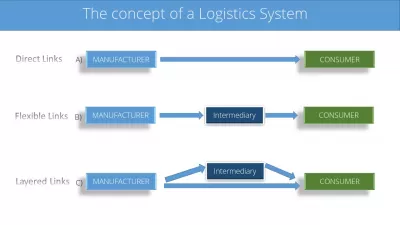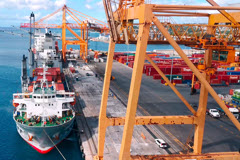物流系統的概念
The 後勤 system is an essential element for a successful business
Today, it is relevant that the 後勤 system is an integral element for the stable functioning of a business in today's market conditions.
A 後勤 system is a complex organizationally completed economic system that consists of subsystems interconnected in a single process of managing financial, personnel, material, information, service and related flows, and the tasks of functioning of these links are united by the internal goals of the business organization and external goals.
Let us consider in more detail the concept of a 後勤 system, its purpose, properties and types.
The concept of a 後勤 system
There are various systems that ensure the functioning of the economic mechanism. In this set, it is necessary to single out the 後勤 systems in order to analyze and improve them.
The generally accepted definition of a 後勤 system says that a 後勤 system is an adaptive feedback system that performs certain 後勤 functions. It, as a rule, consists of several subsystems and has developed connections with the external environment.
The purpose of the 後勤 system is the delivery of goods and products to a given place, in the right quantity and assortment, prepared to the maximum extent possible for industrial or personal consumption at a given level of costs.
The 後勤 system is characterized by a number of properties:
- 系統要素的兼容性(通過最終目標的統一確保);
- the relationship of the elements of the 後勤 system (in external systems, the relationship is ensured by the conclusion of an agreement between the parties, in the internal 後勤 system, the relationship is provided by intra-production relations of the elements);
- 系統元素之間的連接,具有一定的順序,組織;
- 一個積分屬性(系統的單個元素單獨能夠執行系統的功能,即以最小化總成本的採購,生產和營銷;系統的每個元素都可以正常工作並僅實現最終的後勤目標與其他元素)。
The objects of the 後勤 system are enterprises and organizations that have a bank account, their own seal, an independent balance sheet (industrial, construction, transport, supply and marketing organizations); glossings (regional and interregional complexes - fuel and energy, energy systems and associations, etc).
All objects operating outside the 後勤 system belong to the external environment and are included in other 後勤 systems.
宏觀和微觀學系統
In many sources, 後勤 systems are divided into macro後勤 and micro後勤.
宏觀的系統是一個龐大的材料流管理系統,涵蓋了該國不同地區各個部門的工業企業和組織,中介,貿易和運輸組織。宏觀制度是一個地區,國家或國家群體的經濟基礎設施。在形成涵蓋不同國家的宏觀努力系統時,有必要克服與國際經濟關係的法律和經濟特徵相關的困難,以及供應商品的不平等條件,國家運輸法規的差異以及許多其他障礙。州際計劃中宏觀邏輯系統的形成需要創建一個單一的經濟空間,一個沒有內部邊界的單一市場,對商品運輸,資本,信息和勞動力資源運輸的海關障礙。
顯微學系統是子系統,宏觀系統的結構組成部分。其中包括各種工業和商業企業,領土生產綜合體。顯微學系統是一類生產內物流系統,其中包括與單個基礎設施聯合的技術相關行業。
通過連接的物流系統類型
物流系統有三種類型:具有直接鏈接,靈活和分層的物流系統。
具有直接連接的物流系統。材料流直接從產品生產國傳遞到消費者%%(例如,電力的生產和消耗)。
分層物流系統。材料流的路徑上至少有一個中介。例如,計算機技術電子元素的批發基礎。
靈活的物流系統。從生產者到消費者的材料流動的運動可以直接和中介進行。例如,從冶金工廠的交付是按照大型機器建設企業的訂單進行的,也可以轉到批發基地,以出售給中小型企業。
總結有關物流系統的數據
從系統理論的角度來看,物流系統是執行某些物流功能和操作的自適應反饋系統。物流系統可以由幾個子系統組成,並已與外部環境建立了聯繫。
物流系統是企業在當今市場條件下穩定運作的基本要素。
這是一個複雜的組織經濟系統,由在管理所有類型的物流系統中管理財務,人員,材料,信息,服務和相關流程的單一過程中相互聯繫的子系統組成。作為物流系統,可以考慮各種企業 - 工業,貿易,運輸,金融,中介及其綜合體。
與任何其他系統一樣,物流系統具有某些屬性:
- 完整性 - 系統部分與單個有目的活動的內部關係。完整性的基礎是各個部分的緊密互連。
- 自治 - 無論環境如何,系統在相當廣泛的範圍內運行和發展的能力。
- 內部連接 - 系統的元素相互連接,而係統元素之間的連接比系統元素與外部環境的連接更強。內部鏈接以某種方式排序,即形成系統的結構。
- 系統的複雜性取決於元素數量,其相互作用的性質,執行功能的複雜性,環境因素等。
- 與環境的互動。
物流系統的標誌是流過程和系統完整性的存在。
常見問題
- 本文討論的物流系統的基本組成部分是什麼?
- 本文概述了物流系統的基本組成部分,包括運輸,倉儲,庫存管理,訂單處理以及這些組件的集成以進行有效的商品運輸和供應鏈管理。

Freelancer,作者,網站創建者和SEO專家Elena也是稅務專家。她的目標是使高質量的信息最多可用,以幫助他們改善個人和職業生活。

